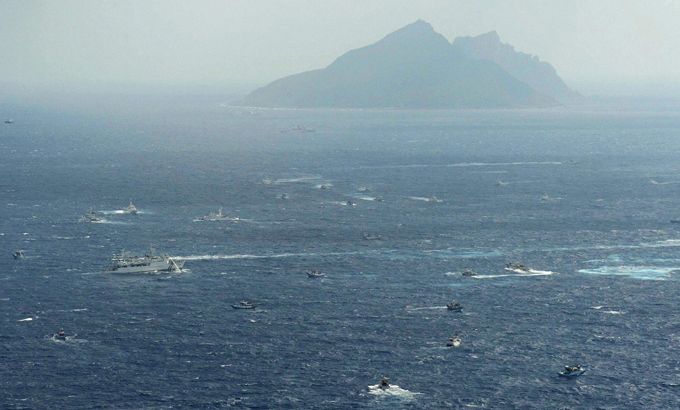China accuses Japan of stealing islands
The Chinese foreign minister tells the UN General Assembly that Japan ‘stole’ the disputed islands from China.

China has taken a bitter territorial dispute with Japan to the UN General Assembly, with Foreign Minister Yang Jiechi accusing Tokyo of stealing disputed islands.
The Japanese government’s purchase of the East China Sea islands from a private owner has infuriated the Beijing government and sparked violent protests in several Chinese cities.
“China strongly urges Japan to immediately stop all activities that violate China’s territorial sovereignty, take concrete actions to correct its mistakes and return to the track of resolving the dispute through negotiation,” Yang told the UN assembly on Thursday.
China has demanded the return of the islands, known as the Diaoyu in Chinese and the Senkaku in Japanese, for decades. Yang reaffirmed his country’s historical claim that Japan tricked his country into signing a treaty ceding the islands in 1895.
“The moves taken by Japan are totally illegal and invalid. They can in no way change the historical fact that Japan stole Diaoyu and its affiliated islands from China and the fact that China has territorial sovereignty over them,” said the Chinese minister.
Yang’s speech came two days after stern talks he held with Japan’s Foreign Minister Koichiro Gemba on the dispute.
Japan has repeatedly insisted that the islands come under its control.
Japan vows no compromise
On Wednesday, Japan’s Prime Minister Yoshihiko Noda insisted that there could be no compromise with China on the ownership of a disputed island chain and denounced attacks on Japanese interests.
“So far as the Senkaku islands are concerned, they are an integral part of our territory in the light of history and of international law,” Noda told reporters at the UN General Assembly in New York on Wednesday, referring to an archipelago in the East China Sea that China knows as Diaoyu.
“It is very clear and there are no territorial issues as such. Therefore there cannot be any compromise that could mean any setback from this basic position. I have to make that very clear,” he told reporters.
“The resolution of this issue should not be by force, but calmly, through reason and with respect for international law.”
Rising tension
|
|
The dispute erupted into an angry war of words between Beijing and Tokyo after the Japanese government took the previously privately-held islands into public ownership, but Noda insisted this move had been misinterpreted.
“Part of the Senkaku islands that was held by a private citizen was transferred to governmental possession in order to ensure the stable management of it,” he said, according to an official translation.
“It is not a new acquisition. It was held under the private ownership of a Japanese citizen and was a transfer of ownership within Japanese law,” he said, adding: “We have explained this to China at length.”
“But it seems that China has yet to understand that and, because of that lack of understanding, there has been an attack or acts of violence and destruction against Japanese citizens and property there,” he complained.
Victor Gao from the National Association of International Studies in Beijing told Al Jazeera that no one on the Chinese side wanted to see an escalation in tensions.
But Gao blamed what he called “adventurous steps” taken by Japan, including the nationalisation of the islands.
“If Prime Minister [Noda] thinks that the Japanese actions will not have consequences he is completely wrong,” Gao said.
“If he wants to provoke a war then he would have good company.”
Economic price
The attacks on Japanese factories and businesses have ostensibly been carried out spontaneously by patriotic crowds, but such protests are usually tightly policed in China, leading to suspicions of official collusion.
Noda refused to be drawn on whether Japan would demand compensation from China for the damage, but the economic toll of the dispute between two of the world’s biggest trading partners is mounting daily.
Shortly before the Japanese premier spoke, Japanese airline All Nippon Airways (ANA) revealed that 40,000 reservations had been canceled on its Japan-China flights until November.
And Japanese auto giants Toyota and Nissan said they would cut production in China because demand for Japanese cars has been hit by the row.
Japanese envoys in New York said they could see no reason why sovereignty over the islands should be in doubt, but Noda said Japan would be confident of victory if the case were referred to the International Court of Justice.
In a complicated three-way dispute, Taiwan also claims ownership of the chain. South Korea and Japan, meanwhile, dispute the sovereignty of another island, known in Japan as Takeshima, but administered from Seoul.